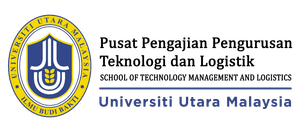FOODS INGREDIENTS MANAGEMENT: INBOUND AND OUTBOUND HALAL MANAGEMENT BEST PRACTICE
DOI:
https://doi.org/10.32890/jtom2018.13.2.4Keywords:
Food ingredient management, halal logistics, halal inbound and outboundAbstract
Foods and ingredients management in the inbound and outbound of warehouse has become significant priority to ensure the quality of halal products. This study will benefit the society among the Muslims and Non-Muslims communities. Manufacturers can interconnect the information to improve and identify factors affecting the consumers who are doubtful of choosing halal products. The objective of the study focus to examine the inbound and outbound efficiency of food ingredients management for halal management best practice in the warehouse. The researchers chose Saudi Cold Storage Sdn. Bhd as the model and respondents of the study. Questionnaires consisted of 26 questions are applied and distributed to the company’s employees. Inbound and outbound efficiency of food ingredients management are the independent variables for halal management best practice who acted as dependent variable. Theoretically, this research contributed the study on the inbound and outbound efficiencies of food ingredients management affected the halal management best practice. Practically, the study is applicable for managers in the halal food industries in their operational decisions making. The outcome of this research is positively reacted and explored for future studies related to halal warehousing and its operations.
Metrics
References
Baharuddin, K., Kassim, N. A., Nordin, S. K., & Buyong, S. Z. (2015). Understanding the Halal Concept and the Importance of Information on Halal Food Business Needed by Potential Malaysian Entrepreneurs. International Journal of Academic Research in Business and Social Sciences, 5(2), 170-180.
Fadzlillah, N. A., Man, Y. B., Jamaludin, M. A., Rahman, S. A., & Al-Kahtani, H. A. (2011). Halal Food Issues from Islamic and Modern Science Perspectives. International Proceedings of Economics Development Research, Vol.17. (2011) IACSIT Press, Singapore
Hani, M., & Al-Mazeedi, J. M. (2013). Issue of Undeclared Ingredient in Halal and Kosher Food Production : A Focus on Processing Aids. Comprehensive reviews, 228-233.
Hassan, F., Musa, R., & Rahman, N. A. (2014). Assessing Consumers’ Perception, Knowledge and Religiosity on Malaysia's Halal Food Products. Procedia-Social and Behavioral Sciences, 130, 120-128.
Jaafar, H. S., Endut, I. R., Faisol, N., & Omar, E. N. (2011). Innovation in logistics services-halal logistics. Proceedings of the 16th International Symposium on Logistics (ISL), Berlin, Germany, 10-13 July, pp 844-851. ISBN:978-085358-279-3
Krishnan, S., Omar, C. M., Zahran, I., Syazwan, N., & Alyaa, S. (2017). The Awareness of Gen Z’s toward Halal Food Industry. Management 2017, 7(1), 44-47.
Mahidin, N., Othman, S. N., & Saifudin, A. M. (2017). Halal Food Logistics: The Challenges among Food & Beverages Small and Medium Sizes Manufacturers. International Journal of Supply Chain Management, 6(3), 337-344.
Mohamed, H. P., Ismail, K. P., Rasi, R. Z., Ahmad Mohamad, M. F., & Yusoff, W. F. (2016). Towards an Integrated and Streamlined Halal Supply Chain in Malaysia-Challenges, Best Practises and Framework. The Social Sciences, 11(11), 2864-2870.
Nawai, N., Nooh, M. N., Ridzwan, N., Dali, S. M., & Mohammad, H. (2007). An exploratory study on halal branding among consumers in Malaysia: factor analysis technique. Journal of Muamalat and Islamic Finance Research, 1(4), 19-44.
Noordin, N., Noor, N. L. M., & Samicho, Z. (2014). Strategic approach to halal certification system: an ecosystem perspective. Procedia-Social and Behavioral Sciences, 121, 79-95.
Qureshi, F. A. (2017). Issues on the Halal Food: Ingredients and Production. https://www.linkedin.com/pulse/issues-halal-food-ingredients-production-mufti-fahad-ahmed-qureshi
Riaz, M. N., & Chaudry, M. M. (2004). Halal Food Production. ISBN 1-58716-029-3 (alk. paper), Florida, US
Saifudin, A. M., Othman, S. N., & Elias, E. M. (2016). A Study of Halal Awareness and Knowledge Among Entrepreneur Undergraduates. International Journal of Supply Chain Management, 5(3), 147-150.
Tariq, S., & Woodman, J. (2013). Using mixed methods in health research. JRSM Short Reports, 4(6). doi: 10.1177/2042533313479197. eCollection 2013 Dec. PMID: 24475347
Tieman, M. (2011). The application of Halal in supply chain management: In-depth interviews. Journal of Islamic Marketing, 2(2), 186-195.
Tieman, M., Vorst, J. G. A., & Ghazali, M. C. (2012). Principles in halal supply chain management. Journal of Islamic Marketing, 3(3), 217-243.
Yusaini, H., & Mohamed, A. R. (2016). Halal Traceability in Enhancing Halal Integrity for Food Industry in Malaysia. International Research Journal of Engineering, 3(3), 68-73.
Yusuf, A. H., Shukor, S. A., & Bustamam (2016). U. S. A. Halal Certification vs Business Growth of Food Industry in Malaysia. Journal of Economics, Business and Management, 4(3), 247-251.
Zailani, S., Arrifin, Z., Abd Wahid, N., Othman, R., & Fernando, Y. (2010). Halal traceability and halal tracking systems in strengthening halal food supply chains for food industry in Malaysia (a review). Journal of food Technology, 74-81.
Downloads
Published
How to Cite
Issue
Section
License
Disclaimer
The Journal of Technology and Operation Management (JTOM) has taken all reasonable measures to ensure that material contained in this website is the original work of the author(s). However, the Journal gives no warranty and accepts no responsibility for the accuracy or the completeness of the material; no reliance should be made by any user on the material. The user should check with the authors for confirmation. Articles published in the Journal of Technology and Operation Management (JTOM) do not represent the views held by the editors and members of the editorial board. Authors are responsible for all aspects of their articles except the editorial screen design.














